The Climate Movement Post Keystone
Air Date: Week of November 13, 2015
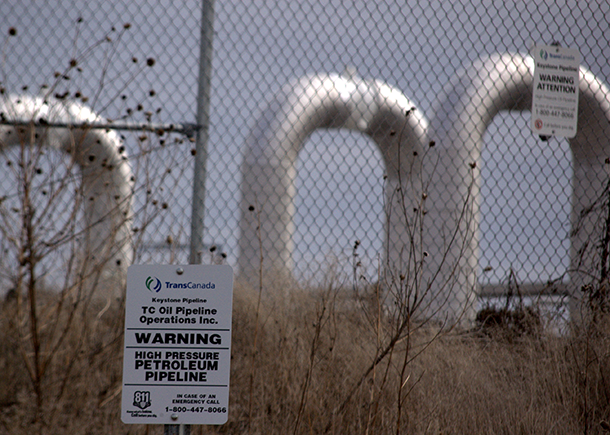
TransCanada’s Keystone XL pipeline would have carried 830,000 barrels of oil per day. (Photo: shannonpatrick17, Flickr CC BY 2.0)
President Obama has struck down the tar sands Keystone XL pipeline and many suggest that’s partly politically motivated and partly in response to the environmental demand to “Keep fossil fuels in the Ground.” Host Steve Curwood and Michael Brune, Executive Director of the Sierra Club, reflect on the defeat of the Keystone XL pipeline, the need for civil disobedience, and what’s next for the environmental movement domestically and as the world heads to the UN’s Paris climate talks.
Transcript
CURWOOD: From the Jennifer and Ted Stanley Studios at the University of Massachusetts Boston and PRI, this is Living on Earth. I’m Steve Curwood. President Obama’s recent rejection of the Keystone XL pipeline to transport tar sands crude from Alberta to Gulf coast refineries marks the end of more than six years of review, and years of mass protests and arrests of campaigners right at the White House. Delays ultimately made Keystone XL less important to the oil industry, along with the lower price of oil, more oil trains and the conversion of other pipelines, though industry fought hard, often through Republican members of Congress, to keep Keystone alive. But the pipeline’s rejection is seen as a huge victory to the movement activists have dubbed “keep it in the ground,” words President Obama echoed when he announced his decision November 6th.
OBAMA: Ultimately if we're going to prevent large parts of this Earth from becoming not only inhospitable but uninhabitable in our lifetimes, we're going to have to keep some fossil fuels in the ground rather than burn them.
CURWOOD: Sierra Club Executive Director Michael Brune was one of the hundreds of climate campaigners jailed during the wave of demonstrations, and he joins us now. Michael, welcome back to Living on Earth.
BRUNE: Hi, Steve.
CURWOOD: Now, how do you, your club members and other activists feel now about Obama's decision to block Keystone?
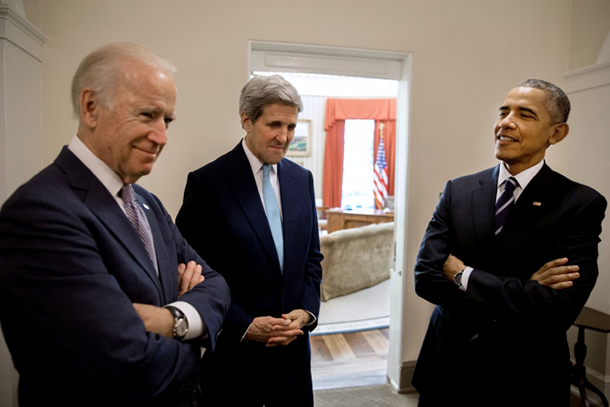
President Barack Obama talks with Vice President Joe Biden and Secretary of State John Kerry outside the Oval Office prior to entering the Roosevelt Room to announce the administration's rejection of the Keystone XL pipeline on Nov. 6, 2015. (Photo: Official White House Photo by Pete Souza)
BRUNE: We're all thrilled. This is one of the biggest victories in the environmental movement in the last several years, in part because it means that'll be very difficult to expand development in the tar sands, but also because this is the first victory in what will be a long-term campaign to keep more fossil fuels in the ground, more oil, more coal, more gas in the ground rather than extracting and burning them which is, of course, a big part of the fight against climate change.
CURWOOD: Now, of course, much of the Alberta tar sands oil, even given the reduced price of oil, it's still getting to market. What do you say to people who suggest that the victory was more symbolic than substantive?
BRUNE: Well, it's not true, and I know that for a fact because when I talk to the oil industry candidly and off the record they will tell me as much. Here's what's happening in the tar sands. They produce about two million barrels of oil a day, much of which is sent down into the United States. The tar sands is landlocked and they are almost at capacity. They need more access to markets in order to grow. The Keystone XL pipeline would've dramatically expanded extraction from the tar sands and now that has been taken off the table. It is not profitable for the oil industry to ship large amounts of tar sands crude by rail. It's also dangerous. It's highly expensive. So this victory is important because it will dramatically slow down the rate of growth in the tar sands, but it's also important because what it says is that our movement has become so strong that we're beginning to stop carbon pollution at its source.
CURWOOD: In your view, how powerful is the climate movement that we have today and how important was Keystone as the galvanizing fight for that movement?
BRUNE: Well, the Keystone fight has been a big part of the environmental movement particularly in North America for the last five, six, seven years. But it's really just a part of the movement. We have become big enough and broad enough that we have seen tremendous progress on a number of fronts. Just to give an example, the same day that the president announced that he was rejecting Keystone, we also celebrated the announced retirement of the 206th coal fired power plant in United States. That progress has helped the United States to cut its carbon pollution by 18 percent, which is more than any other country in the world. So the victory in the tar sands is coupled with the victories that we've seen against coal plants in the US, the progress that we're seeing on clean energy across the country and around the world, and I think it gives a reason for hope that we actually were up to the task as a country and as a species at actually being successful in fighting climate change.
CURWOOD: What did you make of the president's use of the phrase "keep it in the ground"?
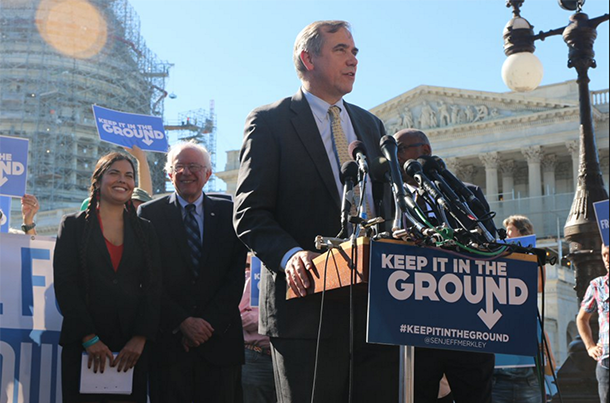
Senators Jeff Merkley (D-OR) and Bernie Sanders (I-VT) introduced the Keep It In the Ground Act on November 4, 2015. (Photo: office of Sen. Jeff Merkley)
BRUNE: Well, it was one of the more satisfying phrases I've ever heard the president say because we have been fighting for years in the climate and energy space, and most of the work that we have been doing has been on the demand side, making our cars and trucks more fuel-efficient, cleaning up power plants, tackling pollution at the smokestacks. All of that is strong, it's effective, but what we really need to do is to couple that with a supply side strategy. So the president implicitly acknowledged that. He says we have to keep some dirty fuels in the ground rather than burning them, and this represents a great victory because what it will mean in the future is that the Obama climate test can be applied to other energy infrastructure projects. For example, should we expand a coal mine in Utah right next to adjacent national parks that not only will contribute to haze in our national parks but also it will make climate change, much, much worse. That kind of test about whether we should even extract fossil fuels in the same quantities, is a groundbreaking moment for US energy policy and it's a great victory for climate activism around the world.
CURWOOD: So, I'm thinking back to September when there were protests at the White House demanding that President Obama halt the attraction of fossil fuels from federal lands and waters, and just recently Senators Jeff Merkley, a Democrat from Oregon, and Bernie Sanders, the independent from Vermont who's running for president, introduced what they call a "keep it in the ground" act which would block new leases for offshore drilling and fossil fuel development on public lands. Michael, to what extent is keep it in the ground going to be the new rallying point of the climate activism movement here in the US now that Keystone is now, well, moving towards history books?
BRUNE: I think it'll be a big part. To be clear, there's lots of things happening at the same time but this is what is new and this is something that's really exciting to a lot of people, the idea that we can grow our economy, we can create jobs, we can increase prosperity by transitioning our economy to clean energy. We don't have to expand mining on taxpayer owned lands when solar and wind will do a better job. We don't have to frack or drill for oil and gas on, again, public lands when we know that investing in energy storage, advanced batteries, electric vehicles will create more jobs, it'll clean up our air and water and it will stimulate our economy even more.
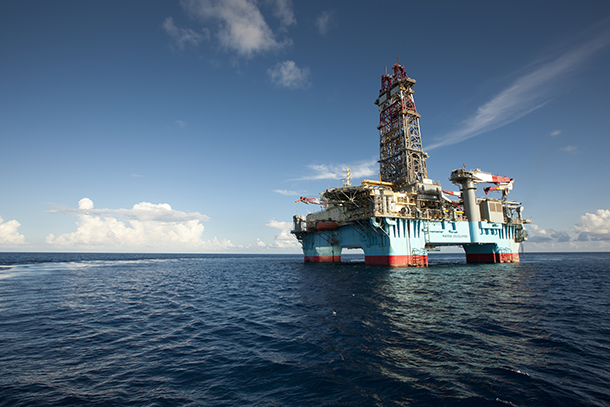
The Keep It In the Ground Act would prohibit all offshore drilling in the Arctic and the Atlantic Ocean. (Photo: Robert Seale/Maersk Drilling, Flickr CC BY-NC-ND 2.0)
CURWOOD: How likely is it that "a keep it in the ground act", a law cutting off fossil fuel extraction for public property could get through this or even the next Congress do you think?
BRUNE: I'm very hopeful for this strategy. I think that what you'll see over the next few years is an increased level of engagement from federal agencies, so the Department of the Interior in particular, but also the Department of Energy, Department of Agriculture, the White House itself, that begins to look at new coal, oil and gas proposals, new leases, with an increased amount of skepticism and in terms of a bill being passed, we have an obvious obstacle right now in which much of the Republican Party doesn't even acknowledge that climate change exists, rarely acknowledges the economic benefits of clean energy, and we have to find a way to break through that.
CURWOOD: Back in the civil rights days, the sit-in at a particular lunch counter that resulted in arrests and perhaps the desegregation of that lunch counter didn't guarantee that other lunch counters were going to be desegregated. People had to go to jail again and again and again. Given the length of time it might take from Congress to get its head wrapped around this, how soon are you planning to get arrested to protest the leasing of federal lands from fossil fuel extraction and when do you think the new phase of this movement catches fire?
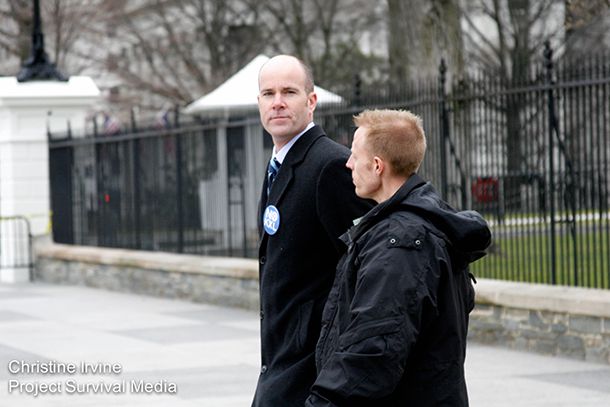
Michael Brune was arrested in front of the White House on February 14, 2013 along with 47 other environmental, civil rights and community leaders who demanded that President Obama reject the Keystone XL pipeline. (Photo: Christine Irvine/tarsandsaction, Flickr CC BY 2.0)
BRUNE: Look, I will engage in peaceful civil obedience anytime that I think it will be effective at accelerating our transition to a clean energy economy. So if I need to participate in civil disobedience to protect the Red Rock Canyons of Utah or to stop fracking in California or to show that clean energy will do a much better job, then I'm happy to participate in that. A couple years ago, I was with my wife and our kids on the National Mall in Washington DC, and at the American History Museum there was a display of the Woolworths counter where some of the first sit-ins took place at the civil rights museum. And I remember my daughter was about seven years old at the time, and I talked with her about the civil rights movement and the fact that African-Americans were not allowed to sit at the lunch counter and buy lunch, and she thought that that was insane. She thought it was absurd. She couldn't believe that people would have to get arrested to protest the law that was so unjust. And I think that if you look at where we are today in 2015 it is crazy that we are fracking in our watersheds and near our national parks. We are so dependent on fossil fuels that it threatens the stability of our climate, and if it takes civil obedience to accelerate the rate at which we're addressing this problem or to advance solutions, then it is an easy decision to participate in such an action, and I would be proud to do so on behalf of the Sierra Club once again.
CURWOOD: Looking ahead now to the climate summit that opens in Paris at the end of this month, how important do you think the President's rejection of Keystone was for US credibility at the negotiating table there?
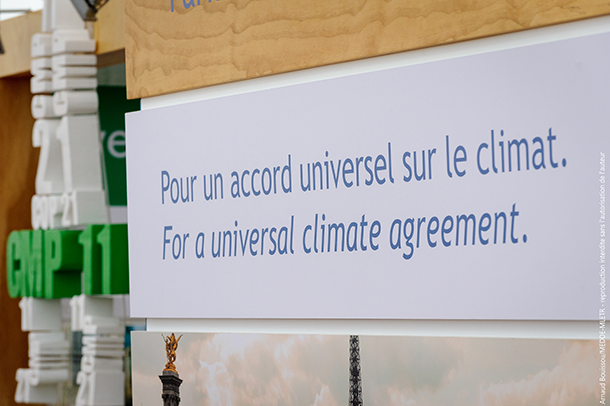
Brune says that President Obama’s rejection of Keystone XL, just weeks before the Conference of the Parties in Paris, shows that the U.S. is serious about ensuring that some fossil fuels stay in the ground. (Photo: Arnaud Bouissou/Le Centre d’Information sur I’Eau, Flickr CC BY-ND 2.0)
BRUNE: The president's rejection just a few weeks before the climate summit opens in Paris is critical. It shows that the US is committed, that we are sincere, and we are unwavering in our determination to not just hit the goals that we've set out in this country to cut carbon pollution, but that we expect to exceed those goals and lead other countries around the world in transitioning to clean energy. The president has taken a lot of actions over the last seven years to make our cars and trucks more fuel efficient, to replace dirty coal plants with clean energy, but his announcement on Keystone shows that he's also willing to take actions to make sure that fossil fuels stay in the ground, and that is a huge victory for what were trying to achieve in Paris.
CURWOOD: Michael Brune is the Executive Director of the Sierra Club. Michael, thanks so much for speaking with us today.
BRUNE: Thank you, Steve, it's good to talk to you again.
Links
Michael Brune’s post: “The Pipeline Stops Here”
What critics of the Keystone Campaign misunderstand about climate activism
Bernie Sanders and Jeff Merkley have a new bill to leave fossil fuels in the ground
Keystone’s Dead. Here’s What’s Next on the Enviros’ Hit List
Living on Earth wants to hear from you!
Living on Earth
62 Calef Highway, Suite 212
Lee, NH 03861
Telephone: 617-287-4121
E-mail: comments@loe.org
Newsletter [Click here]
Donate to Living on Earth!
Living on Earth is an independent media program and relies entirely on contributions from listeners and institutions supporting public service. Please donate now to preserve an independent environmental voice.
NewsletterLiving on Earth offers a weekly delivery of the show's rundown to your mailbox. Sign up for our newsletter today!
 Sailors For The Sea: Be the change you want to sea.
Sailors For The Sea: Be the change you want to sea.
 The Grantham Foundation for the Protection of the Environment: Committed to protecting and improving the health of the global environment.
The Grantham Foundation for the Protection of the Environment: Committed to protecting and improving the health of the global environment.
 Contribute to Living on Earth and receive, as our gift to you, an archival print of one of Mark Seth Lender's extraordinary wildlife photographs. Follow the link to see Mark's current collection of photographs.
Contribute to Living on Earth and receive, as our gift to you, an archival print of one of Mark Seth Lender's extraordinary wildlife photographs. Follow the link to see Mark's current collection of photographs.
 Buy a signed copy of Mark Seth Lender's book Smeagull the Seagull & support Living on Earth
Buy a signed copy of Mark Seth Lender's book Smeagull the Seagull & support Living on Earth

